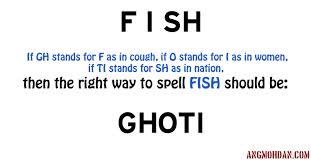Overview
Although sounds many sound the same in English, they may be spelled differently. Therefore, many words that sound similar may be spelled very differently, and any English spelling rule is likely to have exceptions.
Same Sound, Different Spelling
Many similar sounds are expressed by different combinations of letters. For example, the long a as in mate is spelled ai in wait, ay in tray, ei in reign, et in bouquet, ey in whey, and é as in cliché. The broad a in father is spelled as au in pause, al in qualm, o in foster, and ou in bought. The long e is spelled e in cedar, ee in seek, ea in feat, and ei in ceiling. The sound of the consonant f is spelled f in flee, but gh in laugh, ff in off, and ph in phone. The sound of the diphthong sh is spelled sh in shoe, but ch in chute, ci in suspicion, sci in conscience, ssi in mission, and ti in elation.
Final Consonants
Final consonants are doubled if the suffix begins with a vowel when the word has one syllable or if the last syllable is accented. The root word has a vowel and then a single consonant other than w, x, or y. For example, bag becomes baggage, begin becomes beginning, sit becomes sitting, equip becomes equipped, wit becomes witty, and plan becomes planned. While transfer becomes transferred, transfer becomes transferable, an exception to the rule. If the final consonants are preceded by two vowels, such as boat and boating, the final consonant is not doubled.
Final E
Words that end in silent e omit the e when the suffix begins with a vowel, such as argue becomes arguing, give becomes giving, live becomes living, write becomes writing. However, notice becomes noticeable and does not drop the e, manage becomes manageable, and change becomes changeable. Eye becomes eyeing, dye becomes dyeing, and singe becomes singeing. If a word ends in silent e and the suffix begins with a consonant, the e stays, such as encouragement, extremely, lonely, and useful. However, there are exceptions, such as truly, argument, acknowledgment, and judgment.
I before E
The spelling rhyme is “I before E except after C, or when sounded as A as in neighbor and weigh.” Many words follow this rule, such as ceiling, receive, receipt, believe, grief, sieve, and relieve. There are many exceptions, such as counterfeit, foreign, height, neither, seize, and weird.
Interested in English tutoring services? Learn more about how we are assisting thousands of students each academic year.
SchoolTutoring Academy is the premier educational services company for K-12 and college students. We offer tutoring programs for students in K-12, AP classes, and college. To learn more about how we help parents and students in Pittsburgh, PA visit: Tutoring in Pittsburgh, PA





